Nueva canción is a left-wing social movement and musical genre in Latin America and the Iberian peninsula, characterized by folk-inspired styles and socially committed lyrics. Nueva canción is widely recognized to have played a profound role in the pro-democracy social upheavals in Portugal, Spain and Latin America during the 1970s and 1980s, and was popular amongst socialist organizations in the region.

The music of Catalonia comprises one of the oldest documented musical traditions in Europe. In tandem with the rest of Western Europe, it has a long musical tradition, incorporating a number of different styles and genres over the past two thousand years.

Josep Puig i Cadafalch was a Catalan Modernista architect who designed many significant buildings in Barcelona, and a politician who had a significant role in the development of Catalan institutions. He was the architect of the Casa Martí, which became a place of ideas, projects and social gatherings for such well-known Catalans as Santiago Rusiñol and Ramon Casas.
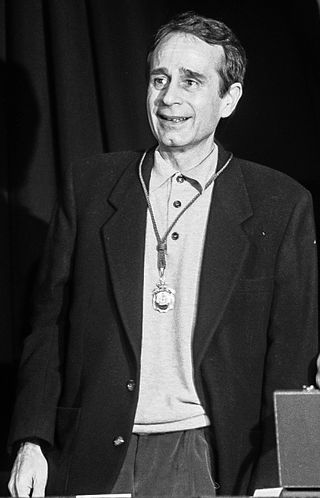
Ovidi Montllor was a Valencian singer-songwriter and actor.

Lluís Llach i Grande (Catalan pronunciation:[ʎuˈizˈʎak]; born in Girona 7 May 1948. Lluis is singer-songwriter, novelist and politician. He is one of the main representatives of the nova cançó genre and an outspoken advocate of the right to self-determination of Catalonia. His most famous song, "L'Estaca", has become the unofficial anthem of the Catalan independence movement. He was a member of the Catalan Parliament from September 2015 until January 2018.
Rock català is a type of music popular in the late 1980s and early 1990s involving Catalan lyrics and many different musical styles.
The Nova Cançó was an artistic movement that promoted Catalan music in Francoist Spain. The movement sought to normalize use of the Catalan language in popular music and denounced the injustices in Francoist Spain. The Grup de Folk, which emerged in the same period, also promoted a new form of popular music in Catalan, drawing inspiration from contemporary American and British music.

Lluís Carreras Ferrer is a Spanish retired footballer who played mostly as a left-back but also as a defensive midfielder, currently a manager.
Els Setze Jutges was a group of singers in the Catalan language founded in 1961 by Miquel Porter i Moix, Remei Margarit, and Josep Maria Espinàs. The name comes from a well known tongue-twister in the Catalan language: Setze jutges d'un jutjat mengen fetge d'un penjat.
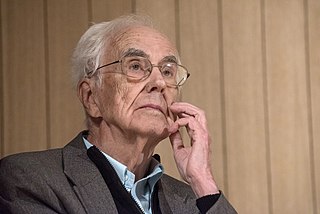
Josep Maria Espinàs Massip was a Spanish writer, journalist and publisher known for his novels, travel writing and newspaper articles.
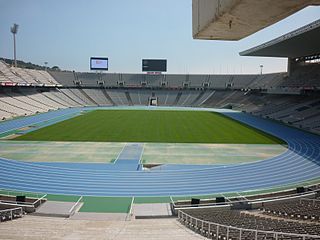
The Míting Internacional d'Atletisme Ciutat de Barcelona is an annual athletics meeting held at the Estadi Olímpic Lluís Companys in Barcelona, Catalonia, Spain. The Meeting was held annually from 1982 to 1990, in 1993 and annually from 1998 to 2000. Before 1990 it was held at Estadi Municipal Joan Serrahima. Re-established in 2008, it is usually held in mid-July. In 2011 it was a European Athletics premium meeting. The 2017 and 2018 editions returned to Estadio Municipal Joan Serrahima.
Tomàs Buxó i Pujadas was a Spanish composer. He studied at the Escola Municipal de Música of Barcelona with Lluís Millet. Buxó was one of the generation of young composers whose works were stamped with Catalan nationalism in the 1910s. He is particularly noted for his settings of Jacint Verdaguer.

Halldor Mar is an Icelandic songwriter and guitarist. His music is based on acoustic folk music and alternative rock. He is also a member of the composing pop rock group Wiggum.
The Sis Hores de Cançó in Canet de Mar was a mass festival of Catalan singing in a time when Catalan, as a language and as a culture, was somehow persecuted by the Spanish Francoist dictatorship. The embryo of this festival can be found in an event that Agrupament Escolta dels Pioners from Canet de Mar organized in the local tennis club court in August 1969. Their leader was Joan Ramon Mainat, brother of Josep Maria Mainat, one of the three members of a hugely popular Catalan band called La Trinca. Most of the greatest Catalan singers involved in the struggle to gain acknowledgment of Catalan as an official language performed there: Lluís Llach, Ovidi Montllor i Francesc Pi de la Serra. Attendance was about 500 people. In April 1970 they organized another concert, which gathered more people.

Bonaventura Gassol i Rovira, known as Ventura Gassol, was a Catalan poet, playwright and politician. A nationalist, he was prominent member of the Esquerra Republicana de Catalunya.
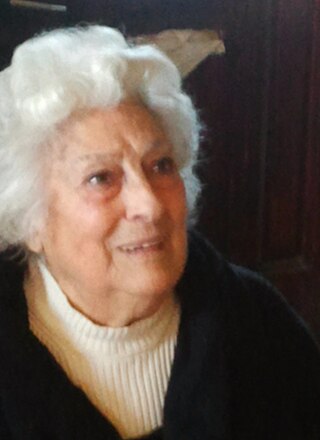
Teresa Rebull, née Teresa Soler i Pi (1919–2015), was a Catalan socialist activist, singer-songwriter and painter. The daughter of anarcho-syndicalists Gonçal Soler i Bernabeu and Balbina Pi i Sanllehy, she joined the POUM and worked as a nurse during the Spanish Civil War. She was actively involved in the May Days events and punished for that. She later escaped Spain, where she could face danger from both Stalinists and Francoists, for France. In France, she would join the Maquis after the Nazi invasion. After the war, she became a singer and was musically associated to Nova Cançó.

Francoism in Catalonia was established within Francoist Spain between 1939 and 1975, following the Spanish Civil War and post-war Francoist repression. Francisco Franco's regime replaced Revolutionary Catalonia after the Catalonia Offensive at the end of the war. The dictatorship in Catalonia complemented the suppression of democratic freedoms with the repression of Catalan culture. Its totalitarian character and its unifying objectives meant the imposition of a single culture and a single language, Castillian. The regime was specifically anti-Catalan, but this did not stop the development of a Catalan Francoism that was forged during the war and fed by victory.

Laura Almerich Santacreu was a classical Spanish guitarist from Barcelona. She is remembered in particular for accompanying the successful Catalan-language singer Lluís Llach since he embarked on his career in the late 1960s. As a result, she was closely associated with the Catalan Nova Cançó movement. Llach dedicated two songs to her: "Laura" (1977) and "Roses blanques".
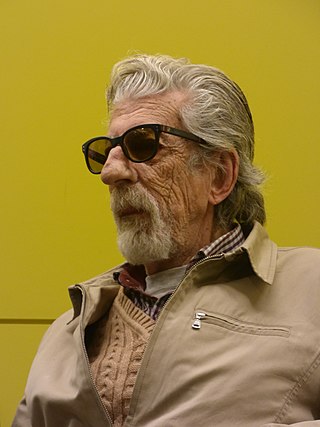
Francesc Burrull was a Spanish jazz musician and composer. In 2017, he was awarded the Creu de Sant Jordi.

Núria Feliu i Mestres was a Spanish Catalan singer and actress, a singular figure of the Nova Cançó movement.














